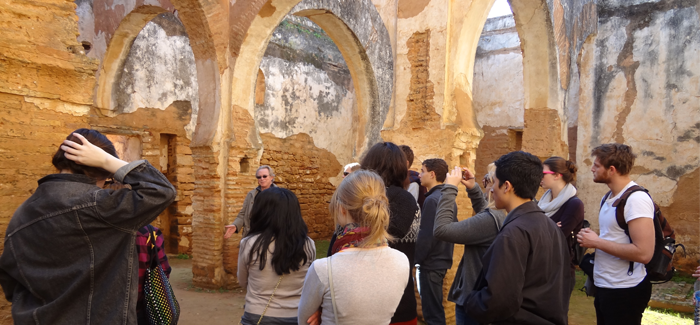
Chellah, a Roman-era ruin in Rabat. (UChicago Study Abroad Office)
Relocation to Rabat
The Cairo study abroad program adjusts to political uncertainty with new educational opportunities elsewhere.
Among the 17 study abroad civilization programs offered, the winter quarter Middle Eastern Civilizations in Cairo has faced perhaps the most daunting challenges. After the uprisings in 2011, the Cairo program was moved to Rabat, Morocco, for 2012, where it will be held again this year.
This past school year, the Cairo program was relocated to Paris, where students had been transferred in 2011 when the unrest began. “We always plan for Cairo,” says Sarah Walter, associate dean of international education in the College, “but with the understanding that it’s not always sustainable for a ten-week study abroad program.” The College has a long history with universities and institutes of learning in Cairo, accepting multiple Egyptian exchange students every year to come study at the College. Because of the breakdown of infrastructure in the wake of the Arab Spring protests, planning a program in Cairo became increasingly difficult. “Though they weren’t in any present danger, they weren’t able to have any kind of meaningful experience, and basic services like ATMs and cell phone connections weren’t reliable,” says Walter.
This year, Walter explains that Rabat was chosen “because it is an intersection of Africa, the Middle East, and Europe.” Besides the wealth of historically and culturally rich cities in Morocco, there is a longer excursion planned to Europe. “The faculty are planning an excursion to southern Spain as they had done in 2012, so that will be a really nice opportunity for the students to see the influence that Islamic civilizations had on the West,” says Walter. This year, the professors teaching this program will be Sofia Torallas Tovar, Holly Shissler, and Cornell Fleischer. Aside from the draw of a new Middle Eastern city added to the opportunities for studying abroad, the temporary Rabat program also boasts a distinguishing feature—students will get to stay with host families. Currently, the only other programs that offer this are Toledo, Spain, and Oaxaca, Mexico. Besides adding to the cultural diversity of the study abroad offerings, the program in Rabat allows students to experience this culture in a new way.
